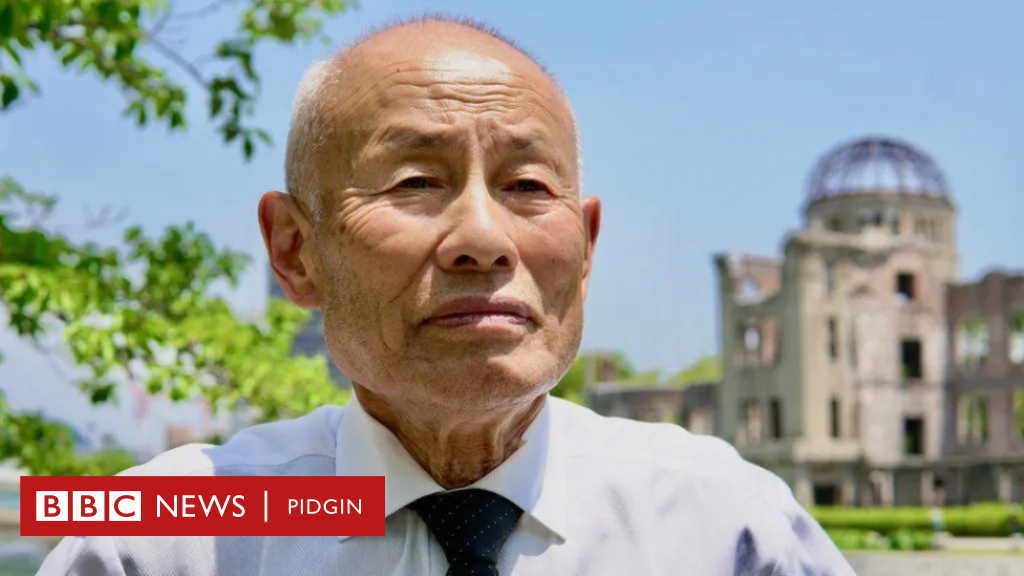One Japanese group of pipo wey survive di atomic bombing wey dem dey call Nihon Hidankyo don win di 2024 Nobel Peace Prize.
Di survivors of di 1945 bombings for Horshima and Naasaki bin win based on di work wey dem dey do to comot nuclear weapons from di world.
Di work of di group wey start for 1956 na to send pipo wey survive di blast to tell dia tori about di kain tin wey dia eye see for di attacks.
Di co-head of di group, Toshiyuili Mimaki cry wen e receive di news. E don tell tori of how e survive di Hiroshima bombing.
E say e be three years old wen di bomb hit and e fit remember confused and burnt survivors dey run for di front of im house.
Di prize include diploma, gold medal and one million dollars. Dem go give di prize for ceremony for December to mark di anniversary of di death of di scientist wey also be di creator of di prize wey dem dey call Alfred Nobel.

Wia dis foto come from, Getty Images
Di oda prize winners for dis year Nobel Prize include:
Nobel Prize in Physics

Wia dis foto come from, Getty Images
John J. Hopfield and Geoffrey E. Hinton win bicos of dia foundational discoveries and inventions wey dey helep machine learning wit artificial neural networks.
Some of di ogbonge tins wey dem fit carry di two pipo work take do na to improve climate modelling, develop solar cells and analyse medical pictures.
British-Canadian Professor Geoffrey Hinton, wey dem dey sometimes call “Godfather of AI”, na im research on neural networks wey make current AI systems like ChatGPT comot.
Meanwhile, Professor John Hopfield invent network wey fit save and recreate patterns, like how wen brain wan remember word e go reason associated or incomplete words take do am.
Nobel Prize in Chemistry

Wia dis foto come from, Getty Images
Di Nobel Prize in Chemistry na tie between David Baker wey run computational protein design and Demis Hassabis and John M. Jumper wey do protein structure prediction.
US based Professor David Baker bin win sake of say e build new proteins wey di committee call “almost impossible feat”. E bin use amino acids for 2003 take create new protein wey pave way to create new proteins wey dem dey use for pharmaceuticals, vaccines among odas.
Meanwhile, Professors Demis Hassabis and John Jumper collabo to use artificial intelligence to take predict di structure of almost all known proteins and create di tool wey dem dey call AlphaFold2.
E dey important to medicine sake of say to sabi protein structure dey important to know how to target am and bifor AlphaFold2, na just a tiny amount of proteins dem bin don work out di structure but now, dem dey use am for 200 million proteins world wide.
One of di professors advise pikin dem say make dem no only dey play video games but also make dem make am as na wetin make am start to dey experiment wit AI.
Nobel Prize in Physiology or Medicine

Wia dis foto come from, Reuters
Dis award go to Victor Ambros and Gary Ruvkun sake of say dem discover microRNA and how e fit work for post-transcriptional gene regulation.
Dia discoveries help to explain how complex life take start for Earth and how di human body dey made up of di different tissues dem wey e get.
MicroRNAs na wetin dey influence di way genes dey controlled inside organisms wey include human beings.
If microRNA no dey regulated wella, e fit contribute to cancer and oda issues like congenital hearing loss and bone disorder.
Nobel Prize in Literature

Wia dis foto come from, Getty Images
Han Kang win di Nobel Prize for Literature for her ogbonge poetic prose wey dey torchlight historical traumas and expose how fragile human life be.
Di committee hail her writing style wey dem call “innovation for contemporary prose”.
She go be di first ever South Korean and di 18th woman wey don win di prize. She also be di only female Nobel Laureate dis year.
Her first major win na for di book ‘The Vegetarian’ wey win am di International Man Booker prize.
Di book na about di kain palava wey one woman face sake of say she no gree chop wetin oda pipo dey chop.
Her oda books include The White Book, Human Acts and Greek Lessons.

